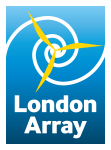London Array Design gets thumbs up.
The new type of wind turbine foundation design used by London Array has been given the seal of approval by industry certification experts DNV.

London Array is among the first in the world to use a conical joint at the top of its monopiles to prevent transition piece slippage.
The design was undertaken in parallel with a separate joint industry project established to overcome problems that have been reported on some monopile foundations. DNV has now formally approved the new design and also issued statements of compliance to cover the rest of the turbine and offshore substation design.
London Array Project Manager, Soren Thorbjorn Larsen said, “The construction and design of what will be the world’s largest offshore wind farm is a major technical and engineering challenge, and we have paid close attention from the very beginning to ensuring that we got the design absolutely right.
“As well as dealing with new industry issues, such as how to safeguard against foundation grouting and slippage problems, we have had to take into account the wide variation in water depths and moveable seabed across the wind farm site.
“On behalf of the project team and the consortium behind London Array, I was delighted to receive formal certification and expert recognition that London Array meets the highest industry standards.
“The designs we have helped pioneer look set to become new best practice for offshore wind.”
The new foundation design features a gently sloping cone at the top of the monopile which then sits inside an inverted cone at the bottom of the transition piece. A layer of grout lies between the two surfaces.
“The sheer scale of this wind farm marks a major step in the evolution of offshore wind and it has been an honour to be part of this milestone project and to work with the highly skilled and professional staff from London Array, its contractors and designers,” said DNV Project Manager, Andreas G. Jensen.
